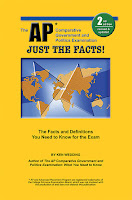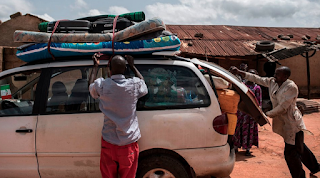The New York Times finally notices
The conflicts and politics in Nigeria finally made the NYT front page. Does that make it more real? How many Americans will read it?
Deadly Lack of Security Plagues Nigeria as Buhari Seeks Re-election
Teaching Comparative blog entries are indexed. Use the search box to look for country names or concept labels attached to each entry.
 Just The Facts! 2nd edition is a concise guide to concepts, terminology, and examples that will appear on May's exam.
Just The Facts! 2nd edition is a concise guide to concepts, terminology, and examples that will appear on May's exam.
Just The Facts! is available. Order HERE.
Amazon's customers gave this book a 5-star rating.
Deadly Lack of Security Plagues Nigeria as Buhari Seeks Re-election
Nigeria is beleaguered by security threats. In the northeast, Islamist extremists from Boko Haram and its splinter groups are waging increasingly complex attacks on military forces and civilians. In the middle part of the country, more than 1,300 people have been killed in increasingly vicious land disputes between cattle herders and farmers. Farther to the south, violence spikes from time to time in the Biafra region, where separatists are pushing to secede. And in various pockets throughout the country, like a major highway between Kaduna and Abuja, kidnappings of prominent figures and regular Nigerians alike have become common.
The threats are becoming a major issue for President Muhammadu Buhari as he tries for a second term in February. Increasingly, critics, and even allies, complain about his failure to take control of the security situation…
After almost a decade into the Boko Haram insurgency, security resources on the frontlines of the conflict are increasingly stretched. On Sunday, according to local reports, several soldiers brought an airport in Borno State, in northeastern Nigeria, to a halt, shooting into the air and threatening their superiors to protest working conditions. It is the third time this year that security forces have protested their plight stemming from the conflict.
Recently, security has deteriorated significantly. In July alone, a total of more than 400 people were killed by Boko Haram or gangs in Zamfara, or in the herder-farmer conflict, according to the International Crisis Group.
In recent weeks, Mr. Buhari’s All Progressives Congress party has been hit with a wave of defections. More than 50 lawmakers, state governors and party members have joined the opposition People’s Democratic Party, many of them worried that any alignment with the president could challenge their prospects in next year’s elections.
People prepare to flee a village near Jos
And bizarre events have left many in the nation concerned about the general state of democracy. Twice in recent weeks, security forces from the Department of State Services, the top spy agency, have appeared in black face masks outside the National Assembly. On Aug. 7, they blocked lawmakers from entering.
Later that day, Vice President Yemi Osinbajo fired the head of the agency. And on Tuesday, he announced that a notorious security agency, the Special Anti-Robbery Squad, would be shut down. The decision was widely welcomed; it followed several months of criticism that Mr. Buhari was again deaf to the concerns of Nigerians, after several protests against alleged abuses by the agency…
The violence has also fueled ethnic divisions within the state between the Hausa and Fulani communities. Many gangs are thought to comprise mostly Fulani members, but Fulani have also been victimized. When they show up at displaced persons camps, Hausa victims have tried to push them away.
Lawal Mustapha, a university student in Zamfara, said he hoped the military intervention in Zamfara would lead to lasting changes. “We want them to restore Zamfara to how it was before all these killings, a peaceful state,” he said. “That will only happen if they improve security permanently, not just to send soldiers in who will then leave soon after.”
Teaching Comparative blog entries are indexed. Use the search box to look for country names or concept labels attached to each entry.
 Just The Facts! 2nd edition is a concise guide to concepts, terminology, and examples that will appear on May's exam.
Just The Facts! 2nd edition is a concise guide to concepts, terminology, and examples that will appear on May's exam.Just The Facts! is available. Order HERE.
Amazon's customers gave this book a 5-star rating.



Comments
Post a Comment